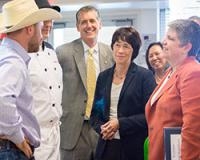Campus Seeking Food Fellows to Support UC Initiative
 UC Merced is recruiting three students to be part of the UC Global Food Initiative, which aims to address how to sustainably and nutritiously feed a world population expected to reach 8 billion by 2025.
UC Merced is recruiting three students to be part of the UC Global Food Initiative, which aims to address how to sustainably and nutritiously feed a world population expected to reach 8 billion by 2025.
The campus has three $2,500 food fellowships open to undergraduate and graduate students, and applications are being accepted through Sept. 30 on Chancellor Dorothy Leland’s website. The recipients will be announced in mid-October. The proposals will be evaluated on how they can advance the UC Global Food Initiative.
Leland touted the opportunities during a meeting today with UC President Janet Napolitano and area food and agriculture leaders.
“We are excited about this opportunity to recognize and support student research, service learning projects, internships and humanitarian efforts connected to the Global Food Initiative,” Leland said. “We have graduate students researching plant ecology, others who are engineering creative solutions to agricultural challenges, and those students who are volunteering their time to develop sustainable practices and address food scarcity.”
Additionally, Napolitano announced the first partners to provide matching funds for the fellowship program.
Craig McNamara, president and owner of walnut-producing Sierra Orchards, and his wife, Julie, will donate $7,500 to the fellowship program. They also have reached out to others to match funds.
Joy Sterling, CEO of Iron Horse Vineyards, and Chez Panisse owner Alice Waters and the Edible Schoolyard Project also have each committed $2,500 to the fellowship program.
“We are pleased and honored that these industry leaders have stepped up to support UC’s fellowship program, which will address critical food issues facing California, the nation and the world,” Napolitano said. “We hope to see others in the agricultural and food industry come forward to partner with the University of California.”
The quest to establish global food security and address related challenges of nutrition and sustainability has never been so important, according to the initiative’s website. A billion people – most of them in developing nations – suffer from chronic hunger or serious nutritional deficiencies. More than half a billion – primarily in industrialized nations – are obese. Against this backdrop, climate change and population growth fuel additional uncertainty and urgency.
Recognizing that the UC is uniquely positioned to play a leading role in addressing the related challenges of nutrition and sustainability, Napolitano, together with UC’s 10 chancellors, launched the UC Global Food Initiative on July 1.
The initiative is aligning the university’s research, outreach and operations in a sustained effort to develop, demonstrate and export solutions – throughout California, the U.S. and the world – for food security, health and sustainability.
The initiative draws on UC’s leadership in agriculture, medicine, nutrition, climate science, public policy, social science, biological science, humanities, arts and law, among other areas.
Its focus is both external, such as how UC translates research into policy and helps communities eat more sustainably, and internal, such as how UC leverages its collective buying power and dining practices to create desirable policies and outcomes.
